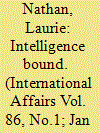|
|
|
Sort Order |
|
|
|
Items / Page
|
|
|
|
|
|
|
| Srl | Item |
| 1 |
ID:
178233


|
|
|
|
|
| Summary/Abstract |
After almost 25 years of what could justifiably be called transformative change in South Africa, a truism is that the country’s new legal order, established by the Constitution in 1993 and 1996, provides the critical foundation of peace and security upon which its freedom has been built. The Constitutional Court was one of the most important of the new democratic institutions in the shaping of the country’s position as a constitutional democracy, upholding the values for which millions of people, black and white, had fought. This article is a brief reflection on the role of the Court in establishing the meaning of this democracy and giving it effect. The main goal of the article is to understand how the Court’s new jurisprudence works in particular contexts, how its work is related to crime and punishment, and what it means for the rights of marginalised groups in society. Using the examples of the Court’s decision in Makwanyane on the death penalty, and the Court’s decision on the findings of the Public Protector’s report on Nkandla, the article finds that the Court’s new jurisprudence takes quite a different view of legal developments in South Africa, insofar as the jurisprudence entrusts broad discretion to the Court and emphasises the need for sustained leadership of the Court to advance the battle for fundamental human rights, the rule of law, and democratic accountability.
|
|
|
|
|
|
|
|
|
|
|
|
|
|
|
|
| 2 |
ID:
095125


|
|
|
|
|
| Publication |
2010.
|
| Summary/Abstract |
This article explores the functions and impact of the South African constitution in relation to the country's intelligence services. The constitution has proved to be a powerful instrument for transforming, controlling and constraining the services, safeguarding human rights and contributing to the management of political conflicts and crises. Yet the constitution's relevance for the intelligence community is also contested and contradictory. Paradoxically, the executive, parliament and the intelligence services believe that it is legitimate for the services to deviate from constitutional provisions because their mandate to identify and counter threats to national security is intended to protect the constitution. The article contributes to filling a gap in the literature on security sector reform, which is concerned with democratic governance but ignores the role of a constitution in regulating the security organizations and determining the nature of their governance arrangements. Intelligence agencies around the world have special powers that permit them to operate with a high level of secrecy and acquire confidential information through the use of intrusive measures. Politicians and intelligence officers can abuse these powers to manipulate the political process, infringe the rights of citizens and subvert democracy. While a constitution cannot eliminate these risks, it can establish an overarching vision, a set of principles and rules and a range of mechanisms for promoting intelligence transformation and adherence to democratic norms.
|
|
|
|
|
|
|
|
|
|
|
|
|
|
|
|
| 3 |
ID:
178239


|
|
|
|
|
| Summary/Abstract |
Newfound hope was seen in South Africa on 27 April 1994, when the country held its first democratic elections. In that spirit, South Africa acceded to the 1951 United Nations Refugee Convention and agreed to uphold its promise of protecting the most vulnerable. However, 25 years on, refugees have experienced increased exclusion and rights violations. The last 25 years have brought with them numerous struggles for refugee communities, including violence, institutionalised xenophobia and a lack of political will. How do we get back the momentum and spirit that paved the way for democracy in South Africa? While South Africa has robust legislative measures, a sense of humanity has been lost in their implementation. This article offers an overview of what it means to be a refugee in democratic South Africa, and it asks whether we can trust our democracy to protect the most vulnerable. By exploring the day-to-day obstacles that refugees encounter from the moment they arrive in South Africa, this article aims to highlight the systematic breakdown of the generous laws that are supposed to protect refugees. The law can work, but an ‘injection of humanity’ is needed in public and private life to ensure that the vision of democracy is upheld.
|
|
|
|
|
|
|
|
|
|
|
|
|
|
|
|
|
|
|
|
|